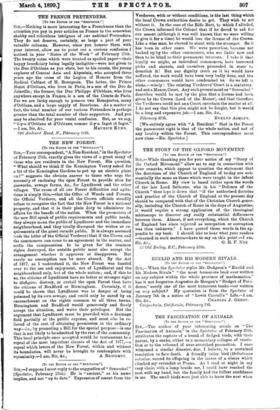THE NEW FOREST.
[To THE EDITOR OF TEl " SPECTATOR."1 SIR,—Your correspondent, "A Non-Resident," in the Spectator of February 25th, exactly gives the views of a great many of those who are residents in the New Forest. His question, "What should we think if the Kensington Vestry asked for a bit of the Kensington Gardens to put up an electric plant on?" suggests the obvious answer to those who urge the necessity of enclosing the open Forest to provide sites for gasworks, sewage farms, &c., for Lyndhurst and the other villages. The cause of all our Forest difficulties and agita- tions is simply this,—that the Office of Woods and Forests, the Official Verderer, and all the Crown officials steadily refuse to recognise the fact that the New Forest is a national property, and that it is their plain duty to administer its affairs for the benefit of the nation. When the promoters of the new Bill speak of public requirements and public needs, they always mean the public of Lyndhurst and the immediate neighbourhood, and they totally disregard the wishes or re- quirements of the great outside public. It is always assumed (vide the letter of the Official Verderer) that if the Crown and the commoners can come to an agreement in the matter, and settle the compensation to be given for the common rights destroyed, the outside public must also accept the arrangement whether it approves or disapproves. But surely no assumption can be more absurd. By the Act of 1877, as I understand it, the New Forest was handed over to the use and enjoyment, not of Lyndhurst and the neighbourhood only, but of the whole nation ; and, if this be so, the citizens of Lyndhurst have no better or stronger right to disfigure, destroy, or curtail the open Forest than have the citizens of Bradford or Birmingham. Certainly, if it could be shown that Lyndhurst was in danger of being poisoned by its own sewage, and could only be saved by an encroachment on the rights common to all three towns, Birmingham and Bradford would generously and freely accept the situation, and waive their privileges. But the argument that Lyndhurst must be provided with a drainage field partially at the public expense, and must also be re- lieved of the cost of obtaining permission in the ordinary way—i.e., by promoting a Bill for the special purpose--is one that is not likely to be admitted by the rest of the community. This local principle once accepted would be tantamount to a repeal of the most important clauses of the Act of 1877,—a repeal which lovers of the New Forest, within and without its boundaries, will never be brought to contemplate with






































 Previous page
Previous page